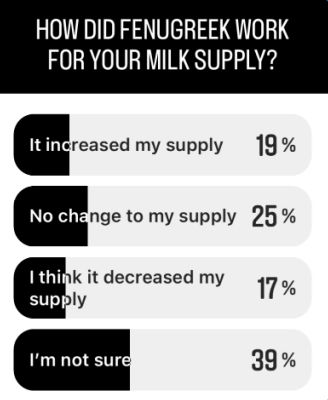I had a great experience using fenugreek to boost my supply when I was exclusively pumping and about 4 weeks postpartum. However, it doesn’t work for everybody – here’s what you should know about fenugreek and milk supply.

This post may contain affiliate links, which means if you click a link and purchase something, I may make a small commission at no additional cost to you. I only recommend products I love! More information here.
Between taking fenugreek and consistently pumping about two hours per day, I was able to get my supply up from 24oz per day to about 35oz per day in a week or so.
Below are some common questions about fenugreek usage:
What is fenugreek, exactly?
Fenugreek is an herb. Its primary uses are as an herb or spice in Indian and Persian cuisine, and as a galactagogue for breastfeeding mothers.
Wait, what is a “galactagogue”? Why would I take one?
A galactagogue is a substance (food or drug) that increases the amount of milk produced by a mammal. Thus, you would take it to increase your milk supply.
How do galactagogues increase milk supply?
Not much clinical research has been done as far as how and why different galactagogues work – especially herbal galactogogues like fenugreek and blessed thistle. Generally, they work by increasing prolactin levels. (Prolactin is the hormone that is responsible for lactation.)
Domperidone, for example, is a prescription medication galactagogue that works by blocking dopamine receptors, which prevents the inhibition of prolactin release, and thus helps increase milk supply.
Does it always work?
No. It works for some women, but not all, and not much clinical research has been done about its effectiveness.
I did an (obviously unscientific) poll on instagram, and about 19% of those that responded said that it worked for them.

Can fenugreek have the opposite effect?
Yes. As you can see in the poll above, some women have reported that they think fenugreek actually decreased their milk supply.
There is always risk when taking supplements. Because of this, I would recommend trying other methods of increasing supply first.
How do I get it, and how many fenugreek capsules should I take? What is the correct fenugreek dosage?
You can order it online from amazon or Puritan’s Pride or any number of places. You can also find it in the vitamin section of some grocery stores.
Most capsules come in 610mg doses. Generally, lactation consultants recommend starting with taking 2 capsules 3 times per day with food (for a total of six capsules per day).
If you don’t have any side effects at this amount (see below) and you don’t smell like maple syrup, you can gradually increase the dosage up to 4 capsules, 3 times per day. More information on dosage is available here.
What are you talking about with the maple syrup?
Smelling like maple syrup is how you know that it’s working. Your sweat and urine will smell like you went on a pancake bender. Your baby might begin to smell that way as well.
If you don’t smell like maple syrup, in most cases the fenugreek won’t do anything for you. That means that if you take 6 610mg capsules per day (2 capsules 3 times per day), but you need 9 (3 capsules 3 times per day), you won’t smell like maple syrup and nothing will happen. There is no incremental benefit from the 6 capsules you did take – you have to get the dose all the way to where it needs to be to get results.
How long does it take for fenugreek to increase milk supply?
If fenugreek works for you, you should see an increase in your pumping output in 24-72 hours.
Do I need to keep taking fenugreek and smelling like maple syrup forever? When can I stop taking fenugreek?
No, you can stop taking fenugreek once your milk supply has increased and leveled out (meaning it’s gone up but then plateaued).
However, to maintain your newly increased milk supply, you do need to keep removing this amount of breast milk from your breasts (via your breast pump). As long as you stick to your pumping schedule, you should be okay.
Need help with exclusive pumping? Use EPUMP30 for 30% off
What are the side effects of fenugreek?
In addition to smelling like maple syrup, you may experience loose stools or hypoglycemia.
Is fenugreek safe?
As always, talk to your doctor about any concerns you have. A few other things to consider:
- You should use it with your OB’s supervision if you are diabetic, because it can lower your blood glucose levels.
- If you have a peanut or chickpea allergy, you should avoid fenugreek.
- If you have asthma, discuss use with your doctor, as there have been reports that fenugreek has worsened the symptoms of mothers with asthma.
- If you have hypothyroidism, talk to your doctor before using fenugreek.
Also, as noted before, some women have noted that their supply has actually decreased while using fenugreek.
Does fenugreek have side effects for the breastfeeding baby?
Most of the time, no, though sometimes your baby might also smell like maple syrup.
Some moms have noticed that their babies became fussy after they started taking fenugreek. If you notice this, it’s worth stopping and seeing if it was maybe causing an upset stomach for your baby.
I’m pregnant again but I’m still nursing my baby and my supply tanked. Can I take fenugreek?
No. Fenugreek is not safe for pregnant women because it can cause uterine contractions.
References
- Bonyata, Kelly, IBCLC. “Fenugreek Seed for Increasing Milk Supply.” https://kellymom.com/bf/can-i-breastfeed/herbs/fenugreek/
- Lacasse, P. “The dopamine antagonist domperidone increases prolactin concentration and enhances milk production.” https://www.ncbi.nlm.nih.gov/pubmed/26298751
- Sim TF, Hattingh HL, Sherriff J, Tee LB. “The Use, Perceived Effectiveness and Safety of Herbal Galactagogues During Breastfeeding: A Qualitative Study.” https://www.ncbi.nlm.nih.gov/pmc/articles/PMC4586661/


















